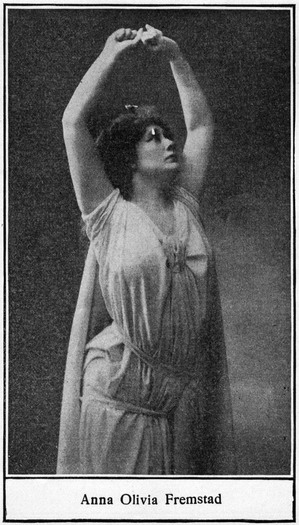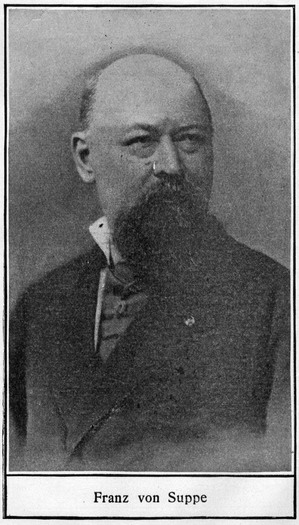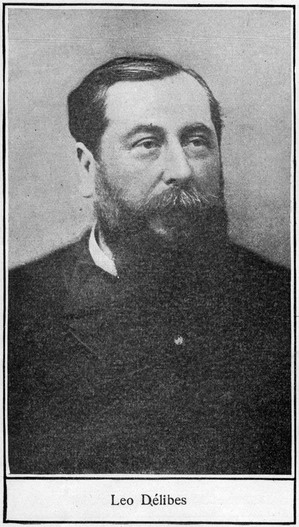 CLEMENT PHILIBERT LEO DELIBES.
CLEMENT PHILIBERT LEO DELIBES.
(Day-leeb’) Délibes was born at St. Germain du Val, France, February, 21, 1836, and died in Paris, January 16, 1891. He went to Paris in 1848 and studied solfège at the Conservatoire, also singing in the Madeleine choir and elsewhere. He studied piano, organ and harmony under Le Couppey, Bénoist, Bazin and Adolphe Adam, and in 1853 became organist at the church of St. Pierre de Chaillot, and at other churches, before finally becoming organist at St. Jean St. François, 1862-71. In 1853 he was also appointed accompanist at the Théâtre Lyrique, and soon devoted himself to dramatic composition. He was so successful in this that, in 1863, he was appointed accompanist at the Opèra, and two years later became second chorus master. It was during this period that he wrote his best works, in the form of ballet music, including the delightful Coppélia ballet. He also wrote a three-act opera, Le Roi l’a dit, which was produced in 1873. In spite of much charming music, it was not a great success, and he returned to the lighter form, producing the Sylvia ballet and other tuneful works. His Lakmé, a dramatic work produced at the opera in 1883, has attained considerable popularity. Délibes became professor of advanced composition at the Conservatoire in 1881. As a composer his fame chiefly rests upon his ballet music.
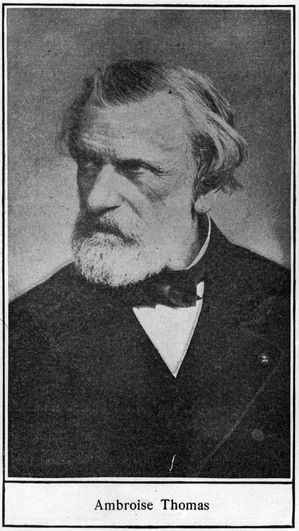 CHARLES LOUIS AMBROISE THOMAS.
CHARLES LOUIS AMBROISE THOMAS.
(Toh’-mas)
Thomas was born at Metz, Lorraine, August 5, 1811, and died in Paris, February 12, 1896. He was the son of a musician, and played the violin and piano while still a child. At the Conservatoire he won the first prize for piano, 1829, for harmony, 1830, and the Grand Prix in 1832. He also studied piano with Kalkbrenner, harmony with Barbereau and composition with the venerable Lesueur—who used to call him his “leading-note,” because he was so sensitive and because he was Lesueur’s seventh pupil to win the Grand Prix. He returned from Italy with a cantata, a mass, a fantasia for piano and orchestra, and other smaller works. Very soon, however, he commenced producing works for the Opèra Comique, and it was here that his genius found full scope. He produced many tuneful operas, most of which are now forgotten. The overture to Raymond is still performed, but Mignon (1866) is frequently given entire in France and elsewhere. The delicate entr’acte from Mignon is very popular, and coloratura sopranos regard the polonaise from this work with the same veneration they have for the Jewel song from Faust. His greatest operatic work, however, is Hamlet (1868). Thomas succeeded Auber as director of the Conservatoire in 1871, and instituted many reforms, and did a vast amount of most valuable work.
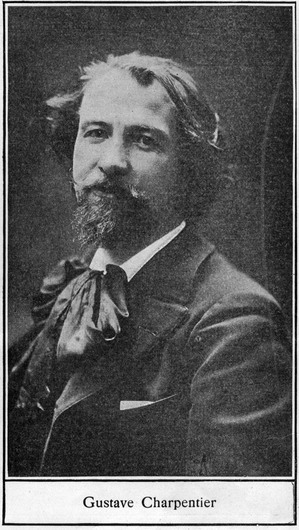 GUSTAVE CHARPENTIER.
GUSTAVE CHARPENTIER.
(Shar-pahn’-te-ay)
Charpentier was born at Dieuze, Alsace-Lorraine, June 25, 1860. At the age of fifteen he went into business for two years, but studied music at the Lille Conservatoire. After carrying off many prizes he went to the Paris Conservatoire in 1881, and studied violin under Massart and composition under Pessard. In 1885 he entered Massenet’s composition class, and two years later won the Grand Prix de Rome. Among the works he brought back with him from Italy was the orchestral suite, Impressions d’Italie, which rapidly became famous, and is frequently heard in America. He also composed his La Vie du Poète, a “symphony-drama” for orchestra, solo and chorus, to words of his own. He wrote other works, including the opera Orphée, and much choral and orchestral music, but the most remarkable work Charpentier has yet accomplished is his “musical romance” Louise, which was produced at the Opera Comique, Paris, in 1900. This work was first heard in America in 1908, when it was produced in New York under Hammerstein’s management. Here, as elsewhere, it created a great impression, and is one of the most notable examples of modern French opera. Charpentier is deeply interested in the social problems of the day, and has voiced many of his opinions in this work—its remarkable libretto is his own work.
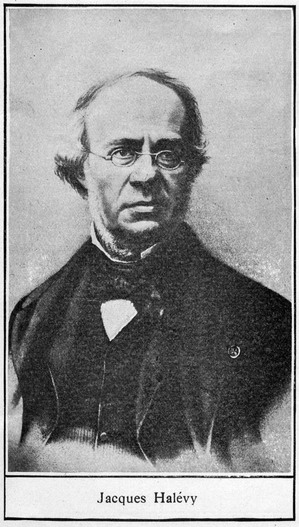 JACQUES FRANCOIS F. E. HALEVY.
JACQUES FRANCOIS F. E. HALEVY.
(Ah-lay’-ve.)
Halévy, whose real name was Levi, was born in Paris, May 27, 1799, and died at Nice, March 17, 1862. He entered the Conservatoire in 1809, and gained a prize in solfège in 1810, and a second prize for harmony in 1811. He then entered Cherubini’s class, and eventually won the Grand Prix de Rome. He had the usual difficulty in obtaining recognition on his return from Rome. In 1827, his L’Artisan was successfully produced, and this paved the way for other operatic works. His reputation increased, but he was still obliged to write whatever was likely to attract attention, often to very poor librettos. In 1835, however, he brought out his best known work, La Juive—The Jewess—and ten months later a successful comedy opera called L’Eclair. The impression created by these excellent works resulted in finally establishing Halévy’s reputation, and procured his entrance into the Institut. Many other dramatic works followed, but nothing to equal La Juive in power and general excellence. He became one of the first professors of the Conservatoire, and while still a student was a teacher of solfège. He was appointed professor of harmony, 1827, of counterpoint and fugue, 1833, and composition, 1840. In this capacity he exerted a great influence, many of his pupils afterwards becoming famous, the most notable being Gounod, Bazin and Massé. He also taught Bizet—who afterwards married his daughter.
Olive Fremstad was born in Stockholm, Sweden, but was brought to America at the age of 12. Her parents settled in St. Peter, Minn., but in 1890 Mme. Fremstad came to New York. She had played the piano at the age of nine, and soon organized a piano class. She became soloist at St. Patrick’s Cathedral, but in 1893 gave this up to go to Berlin, where she remained for eighteen months as a pupil of Lilli Lehmann. She made her début in 1895 as Azucena in Il Trovatore with such success that a year later she sang in the Bayreuth Festival. In 1897 she appeared at the Royal Opera, Vienna, as Brangane in Tristan and Isolde, remaining in Vienna for three years. She then went to Munich and became very popular as Carmen. While she was at Munich she appeared for two seasons at Covent Garden, London, where she first sang the role of Venus in Tannhäuser. Mme. Olive Fremstad first appeared in New York in 1903, and renewed her triumphs in the above rôle, at the same time appearing as Fricka, Brünnhilde, Kundry, Selika, and Santuzza. She also created a rôle of Salome in the American production of Strauss’ opera of that name. She played the part of Salome in Paris with success, and also as Veronique in Bruneau’s opera of that name, and the French government made her an officer of the Academy. As a Wagner singer Mme. Fremstad is supreme.
Suppe, whose complete name was Francesco Ezekiale Ermenegildo Cavaliere Suppe Demelli, was born at Spalato, or aboard ship near it, April 18, 1820, and died May 21, 1895. He played the flute at his eleventh year, studied harmony when he was thirteen, and produced a mass in his fifteenth year. In spite of this musical ability, his father was opposed to his following a musical career, and sent him to the University of Padua. Suppe continued to study music, however, and progressed rapidly. When the death of his father occurred, he joined his mother in Vienna, and after dividing his efforts between practicing medicine, teaching Italian, and following his musical bent, he finally confined himself to the last named career, and accepted an honorary post as conductor at a Vienna theatre. Similar but more profitable posts were obtained at Pressburg and Baden, but Suppe finally returned to Vienna, and in 1865 became conductor of the Leopoldstadt theatre, where he remained until his death. As a composer he produced a very large number of light operas, farces and other similar works. Authorities differ as to the exact number of his works, but they include at least two grand operas, and many of them achieved tremendous success. His operetta, Fatinitza, is still occasionally heard in America, but Suppe is best known by his overtures, Poet and Peasant, etc.


